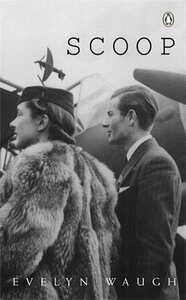Take a photo of a barcode or cover
adventurous
funny
reflective
medium-paced
Plot or Character Driven:
Plot
The random number generator seemed to have second time lucky, as it puled up Scoop as my next novel to read. It also seemed somewhat relevant what with the phone-hacking scandal that has been sweeping the UK, and seems to be touching America too.
The novel opens following John Boot, an explorer who has written a number of books, visiting his patron Mrs Stitch. She agrees to help him get a position on popular paper The Daily Beast, and Lord Cooper, the owner seems to agree. However, there is a bad mix-up in the office and John Boot is confused with William Boot, who writes the kind of ‘country life’ sections of the paper. William is then whisked off to a country he’s never been to and has to suddenly get good at journalistic practices he’s never needed before.
This book was laugh-out-loud funny at certain parts, and I think I’ve come to the conclusion (granted, after only 3 of Waugh’s books) that I prefer his slightly disconnected third-person narrative voice (also seen in Vile Bodies) as opposed to the first-person character voice of Brideshead Revisited. His descriptions were great, really bringing to life Boot’s shambolic journey to Ishamelia, and then the country itself (which seems to be hypothetically situated near Egypt and Sudan).
Plus, the characters were all pretty well developed. I was partly gutted that we didn’t get to see more of John Boot and Mrs Stitch, merely because in a few pages Waugh had managed to make them sound fascinating. William made a sympathetic main character, whose innocence actually managed to work for him, as opposed to against in the end. Other colourful characters included Corker, a journalist for another paper with a habit of collecting curios; Erik Olafson, an eccentric Swede; Katchen, an almost-German beauty who provides a brief love interest for William and Theodore Boot, appearing to be another of Waugh’s rather ‘flamboyant’ characters.
Scoop is a really fun novel, even if it does ridicule and raise questions about press integrity; Corker tells anecdotes of how previous reporters wrote about uprisings happening in towns where nothing of the sort was going on. It is, however, also a light critique of Marxism-the proposed revolution was to be Marxist supporting, and almost (a tiny bit) supportive of familial rule (a la the Royal family) with Ishamelia effectively being run by the Jacksons forever, quite happily and with no complaints from most of the populace.
Politics aside however, Scoop is generally a good book, that deserves as much recognition as Brideshead Revisited. Perhaps now is the time for a television series?
The novel opens following John Boot, an explorer who has written a number of books, visiting his patron Mrs Stitch. She agrees to help him get a position on popular paper The Daily Beast, and Lord Cooper, the owner seems to agree. However, there is a bad mix-up in the office and John Boot is confused with William Boot, who writes the kind of ‘country life’ sections of the paper. William is then whisked off to a country he’s never been to and has to suddenly get good at journalistic practices he’s never needed before.
This book was laugh-out-loud funny at certain parts, and I think I’ve come to the conclusion (granted, after only 3 of Waugh’s books) that I prefer his slightly disconnected third-person narrative voice (also seen in Vile Bodies) as opposed to the first-person character voice of Brideshead Revisited. His descriptions were great, really bringing to life Boot’s shambolic journey to Ishamelia, and then the country itself (which seems to be hypothetically situated near Egypt and Sudan).
Plus, the characters were all pretty well developed. I was partly gutted that we didn’t get to see more of John Boot and Mrs Stitch, merely because in a few pages Waugh had managed to make them sound fascinating. William made a sympathetic main character, whose innocence actually managed to work for him, as opposed to against in the end. Other colourful characters included Corker, a journalist for another paper with a habit of collecting curios; Erik Olafson, an eccentric Swede; Katchen, an almost-German beauty who provides a brief love interest for William and Theodore Boot, appearing to be another of Waugh’s rather ‘flamboyant’ characters.
Scoop is a really fun novel, even if it does ridicule and raise questions about press integrity; Corker tells anecdotes of how previous reporters wrote about uprisings happening in towns where nothing of the sort was going on. It is, however, also a light critique of Marxism-the proposed revolution was to be Marxist supporting, and almost (a tiny bit) supportive of familial rule (a la the Royal family) with Ishamelia effectively being run by the Jacksons forever, quite happily and with no complaints from most of the populace.
Politics aside however, Scoop is generally a good book, that deserves as much recognition as Brideshead Revisited. Perhaps now is the time for a television series?
funny
lighthearted
medium-paced
Strong character development:
Yes
Loveable characters:
No
Diverse cast of characters:
No
Flaws of characters a main focus:
Yes
Scoop shows its age in its attitudes toward race, and it does very much jar on that account. That said, it reflects the attitudes of the time, and thankfully and rightly, times have changed.
The underlying story, a satirical comedy of errors set in the world of journalism, specifically Foreign Correspondents, however, is humorous, and seeing the way some of our modern journalists are behaving, in some ways it feels quite relevant 🙄
The underlying story, a satirical comedy of errors set in the world of journalism, specifically Foreign Correspondents, however, is humorous, and seeing the way some of our modern journalists are behaving, in some ways it feels quite relevant 🙄
Minor: Racial slurs
Contains some racial slurs consistent with the time it was written (1930s)
Beware! This book will have you laughing out loud. even on public transport.
Waugh is a master of the darkly comic.
LOVE
Waugh is a master of the darkly comic.
LOVE
I would have happily given Scoop by Evelyn Waugh a big fat 4 or maybe 4.5 stars if it wasn't for some openly offensive and racist language and observations he uses. It really did cast a shadow over the whole story, which otherwise rolled and rollicked around like the farce it was meant to be. Poking fun at Fleet Street, politicians, foreign policy, aristocracy and "country bumpkin" folk along the way, there was real charm to be enjoyed here and of course Waugh's prose is effortless but fully effective.
Some scenes required a bit more imagination than others, but the crucial twists centring around mistaken identity and a inexperienced journalist accidentally making the "scoop" of the year, are fondly woven into the plot naturally and simply. The characters and dialogue also carry this novella, and Waugh could have gone on to write a book about at least ten of the players caught up in this satire.
My favourite line... "To a journalist all countries are rich."
Some scenes required a bit more imagination than others, but the crucial twists centring around mistaken identity and a inexperienced journalist accidentally making the "scoop" of the year, are fondly woven into the plot naturally and simply. The characters and dialogue also carry this novella, and Waugh could have gone on to write a book about at least ten of the players caught up in this satire.
My favourite line... "To a journalist all countries are rich."
While I don't know much about the real-life characters and situations that Waugh is satirizing, I was still very, very amused by this novel. All throughout, Boot is more or less carried along for the ride and it's only really dumb luck and stubbornness that allow him to ultimately get the scoop that all the journalists are seeking.
The way the journalists go about their work - spending money like crazy, friendly with each other but also ruthlessly competing, worried about writing stories that will sell papers and getting them submitted first but not worried much about whether the stories are true - was very funny.
Also very funny was the relationship between Lord Copper, newspaper magnate, and Mr. Salter, foreign editor. Copper's ever-changing whims are followed to a T, and reading about Mr. Salter trying to operate in the space between Copper and the confused and very under-experienced Boot, was probably my favorite part of the novel.
Most interesting (and scarily real) was the complete lack of understanding around who is fighting who and why in Ishmaelia coupled with the sense that it's still news of national importance. Journalists from around the world are there and submitting stories, but they don't actually know anything at all. This is most evident when they all head off to a city that doesn't even exist, all because one journalist wrote a story about the place and they must all now follow suit.
This is a humorous look at sensationalist journalism that, we can only hope, is more satire than reality.
Themes: journalism, humor, politics, absurdity of war, news vs. truth, mixed-up identity, satire
The way the journalists go about their work - spending money like crazy, friendly with each other but also ruthlessly competing, worried about writing stories that will sell papers and getting them submitted first but not worried much about whether the stories are true - was very funny.
Also very funny was the relationship between Lord Copper, newspaper magnate, and Mr. Salter, foreign editor. Copper's ever-changing whims are followed to a T, and reading about Mr. Salter trying to operate in the space between Copper and the confused and very under-experienced Boot, was probably my favorite part of the novel.
Most interesting (and scarily real) was the complete lack of understanding around who is fighting who and why in Ishmaelia coupled with the sense that it's still news of national importance. Journalists from around the world are there and submitting stories, but they don't actually know anything at all. This is most evident when they all head off to a city that doesn't even exist, all because one journalist wrote a story about the place and they must all now follow suit.
This is a humorous look at sensationalist journalism that, we can only hope, is more satire than reality.
Themes: journalism, humor, politics, absurdity of war, news vs. truth, mixed-up identity, satire
Odd book really. Very dated language and ideas. Didn't see any of the humour, but the irony was laid on in spades
Hard work. Very 'of it's time' and an unfunny farce.
The first two chapters were lovely, dry but absurd British humor, in the vein of Cold Comfort Farm. I think I'll return to it, but it was due back to the library and I wasn't engaged enough to get it again.
Biting and farcical, the tale of "Boot of the Beast" chronicles a case of mistaken identity wherein a country bumpkin (Boot) is sent to cover a non-existent conflict in Africa, only to stumble on a story and get the "scoop" his compatriots have been salivating over. Delightful.




